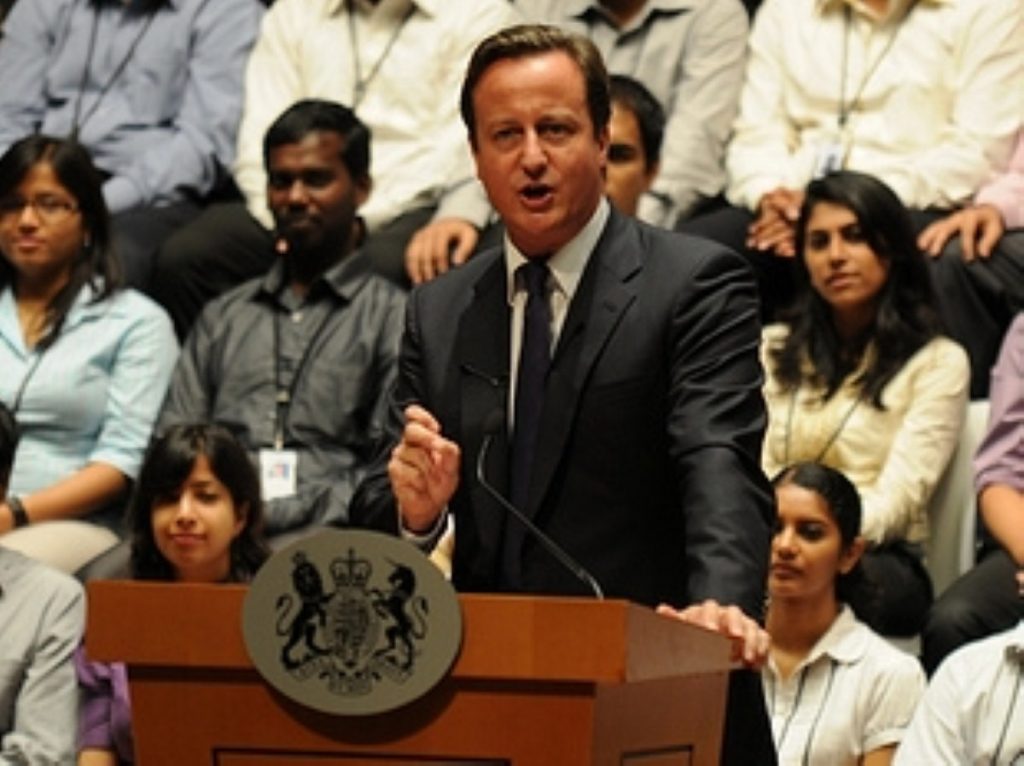‘Humble’ UK seeks Indian special relationship
The strongest British trade delegation to India for decades is beginning its three-day visit, as the UK seeks a new “special relationship” with one of the world’s largest emerging economies.
A 68-person team led by David Cameron and comprising ministers and leading figures from the fields of business, culture, science and technology is courting its Indian counterparts as part of the coalition government’s positive new foreign policy stance towards Delhi.
But the trip has already hit a stumbling block after Indian officials raised concerns over the coalition government’s immigration cap proposals.


Cable widens immigration divide
Plans to limit the influx of non-EU migrants proved a divisive issue during the general election campaign – and business secretary Vince Cable’s comments apparently undermining the government’s stance are unlikely to help.
He is in India to assist in the £500 million sale of Hawk training jets to the Indian air force by arms firm BAE.
This is the largest single deal on the table, but the ambitious breadth of the delegation means collaboration across trade and investment, higher education, science, infrastructure projects and the creative industries are all high on the agenda.
Writing in the Hindu newspaper, Mr Cameron said he was coming to India in a “spirit of humility”.
Comment: The world notices actions, not words
“I know that Britain cannot rely on sentiment and shared history for a place in India’s future,” he pressed.
“Your country has the whole world beating a path to its door. But I believe Britain should be India’s partner of choice in the years ahead.
“Starting this week, that is what we are determined to deliver.”
Dr Cable said the importance with which Britain viewed India was reflected in the fact its first major delegation was being sent there.
“The trade and investment relationship our two countries already have is good – but the government has much higher ambitions and during this visit we want to lay the foundations for a stronger, more successful relationship,” he said.
“The potential benefits are numerous for both India and ourselves and of course this is not just limited to trade. This is also about two-way investment opportunities, learning from one other on higher education and science policy and strengthening the cultural and economic ties between us.”
He has announced plans for the export of civil nuclear technology to India, a first for Britain.
Chancellor George Osborne, foreign secretary William Hague, culture secretary Jeremy Hunt and higher education minister David Willetts are among the other government figures on the trip.
Former Labour health secretary Patricia Hewitt will be attending in her role for the UK-India Business Council. Other senior business figures include CBI director general Richard Lambert, Barclays chief executive John Varley and KPMG chairman John Griffiths-Jones.
Olympians Kelly Holmes and Steve Redgrave form part of the culture and sports delegation.
The delegation is likely to be welcomed in Delhi, where attitudes towards Britain have been hardening in recent years following differences on issues like climate change.
Lalit Mansingh, a former Indian foreign secretary, told the Today programme that the relationship has been “stagnating” as Britain’s influence continues to wane and India’s influence grows.
“Britain is a high-level partner,” he said.
“But to make that partnership meaningful there should be more high-level meetings, more discussions on regional and international issues.”












